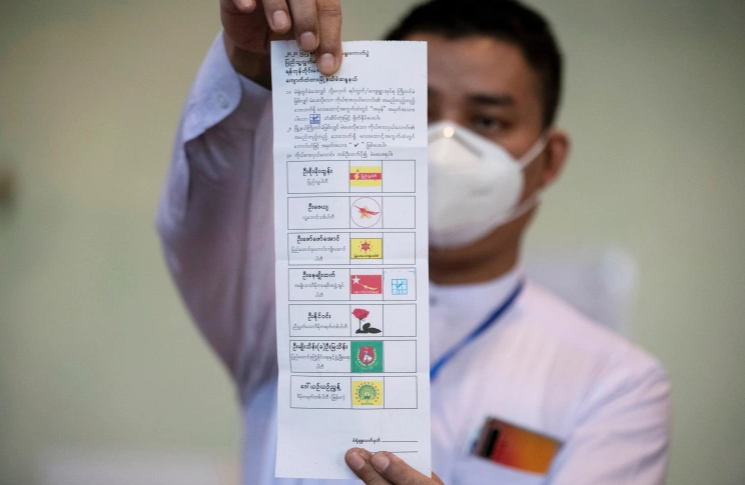
Supporters of Myanmar's National League for Democracy (NLD) hold posters with the image of Suu Kyi. /AFP
Supporters of Myanmar's National League for Democracy (NLD) hold posters with the image of Suu Kyi. /AFP
Myanmar's ruling National League for Democracy (NLD) claimed Monday it had won a parliamentary majority in Sunday's election and would retain power to secure a parliamentary majority on its own.
Although official results have yet to be announced, an NLD spokesperson, Monywa Aung Shin, said the party had confirmed it won more than 322 seats – a majority – but the final outcome "would be likely more than" the party's goal of 377 seats.
The Union Election Commission earlier said full results may take a week. By 8 p.m. Tuesday, it had announced the winners of just nine of Parliament's 642 seats, all nine NLD candidates.

A man displays a ballot used in Myanmar's general elections, November 9, 2020. /Reuters
A man displays a ballot used in Myanmar's general elections, November 9, 2020. /Reuters
Suu Kyi, 75, has retained the mass appeal built up during her decades of democratic activism while Myanmar was under military rule. During the NLD's first five-year term, the Suu Kyi administration struggled to advance peace talks between the country's army, known as the Tatmadaw, and ethnic armed groups that have been locked in a civil war for decades – some since independence in 1948.
Myanmar held this election amid a surge in COVID-19 infections, economic hardships and escalating ethnic conflicts. More than a million people were unable to vote after polls were canceled due to insurgencies. The coronavirus pandemic was a prominent backdrop to the elections, which were held as scheduled even though some parties had urged a postponement. Traditional campaign events like mass rallies were curbed to control the spread of the virus, candidates then projected campaigns in state media and social media while conducting official government business.
The People's Alliance for Credible Elections, one of the biggest poll watching organizations in Myanmar, said that in almost one-third of the polling stations it monitored, a small number of people were unable to cast ballots because their names were not on the voting lists. But the group described election day voting as peaceful and said no major incidents were recorded.
In 2015, the NLD won around 80 percent of contested seats in the Upper and Lower Houses in Myanmar.
The USDP opposition, Myanmar's next biggest party, said it was still collecting information and would not comment.
(With input from agencies)

